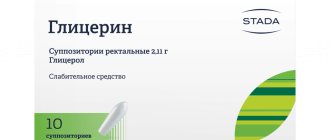A sedentary lifestyle, taking certain medications, stress, or hemorrhoids can cause difficulty bowel movements. Due to the immaturity of the gastrointestinal tract, young children, as well as when switching to artificial feeding or introducing complementary foods into the diet, may also experience problems with stool.
Treatment of chronic disorders involves taking medications. As an emergency measure, suppositories with glycerin for constipation will come to the rescue.
The mechanism of action of suppositories with glycerin
The medication belongs to the group of laxatives with dehydrating and dermatoprotective effects.
The therapeutic effect occurs due to the action of the active component - glycerin, which softens fecal stones and facilitates their movement through the large intestine.
The substance irritates the mucous membrane, thereby activating intestinal motility.
After insertion into the rectum, glycerin suppositories quickly melt, so the laxative effect of their use occurs in 15-30 minutes or earlier, depending on the condition and personal characteristics of the body.
Side effects
Unlike tablets and suspensions, side effects from rectal suppositories are less common. However, allergic reactions are possible:
- itching, burning in the anal area;
- pain and cramps in the lower abdomen;
- nausea;
- diarrhea;
- irritation of the mucous membrane;
- dehydration;
- addiction;
- washing away beneficial bacteria.
In what cases will glycerin suppositories help?
The instructions for glycerin suppositories contain a list of conditions for which they are prescribed. The main indication is difficult defecation or its absolute absence, caused by functional disorders of the gastrointestinal tract, old age/childhood, and psychological problems.
For preventive purposes, suppositories are prescribed to patients after surgical interventions and for pathologies that require the elimination of physical stress.
Including:
- anorectal abscess;
- anal fissures;
- hemorrhoids complicated by blood clots and pain;
- narrowing of the rectal lumen;
- suffered myocardial infarction.
Suppositories with glycerin can be used in preparation for rectal surgery, to prevent constipation after surgery, to avoid constipation after childbirth, and also before examining the rectum with instruments or x-rays.
Useful tips for preventing and combating constipation
- After waking up, half an hour before your morning meal, drink a glass of water. This is necessary to prepare the stomach for digestion;
- Drink more fluids during the day - water, fruit drinks, compotes, herbal teas;
- It is useful to drink kefir before bed. This allows the intestines to prepare for the working day;
- Regularly eat fruits and vegetables, especially beets, prunes, cabbage;
- Eat small portions several times a day, avoid late meals;
- To prevent constipation, you should exclude flour, sweet, fried, and smoked foods from your diet;
- Go to the toilet on time;
- Move more.
If you have problems with bowel movements, you should consult a doctor to determine the cause. Self-medication, as a rule, only aggravates the situation. To prevent bowel difficulties, proper nutrition, a healthy lifestyle, and try to avoid stressful situations are important.
Contraindications for use, side effects
Glycerin suppositories for constipation are prohibited for use when:
- personal intolerance or hypersensitivity to glycerin or additional substances;
- diarrhea;
- irritable bowel syndrome;
- abdominal pain of unknown origin;
- intestinal obstruction;
- hemorrhoids in the acute phase;
- tumors, polyps and fissures in the rectum;
- inflammatory processes in the rectum (proctitis);
- acute inflammation of the appendix;
- bleeding in the rectum;
- pregnancy.
Under the supervision of a physician, they can be used for renal failure and during breastfeeding.
The use of suppositories with glycerin can cause:
- manifestations of allergies;
- discomfort in the anus (burning, itching);
- with frequent and prolonged use, the physiological process of bowel movement may weaken;
- in case of overdose – symptoms of irritable bowel (frequent loose stools).
Effective constipation remedies for elderly bedridden people
Defecation disorders in bedridden patients are associated with the lack of constant mild stimulation of contractions of the intestinal wall, which is carried out through physical activity in healthy people. Therefore, the main task in the fight against constipation in this case is the correct choice of drugs that activate peristalsis. Instant remedies are not suitable for this. It is recommended to use drugs for the treatment of chronic constipation, the active ingredients of which are macrogol, lactulose, and polyethylene glycol.
According to the advice of gastroenterologists, for elderly bedridden patients with constipation, the following are suitable:
- Duphalac
- probiotic, lactulose-based drug in the form of syrup. The medicine stimulates the contraction of the intestinal walls, softens its contents, changes the microflora of the colon, and increases the acidity in its lumen. Does not affect smooth muscles and mucous membranes. The dosage depends on the individual characteristics of the body and is selected by the attending physician. This constipation medication can be used continuously for longer than six months. Complete analogues of Duphalac: Normaze, Portalak. Contraindications for use: suspected appendicitis, lactose intolerance, rectal bleeding. - Forlax
- a constipation remedy for older people with an osmotic effect, increasing the volume of intestinal contents. The active ingredient is macrogol. Release form: powder. Effective 24–48 hours after application. Duration of use - up to three months. Dosage - no more than four sachets per day. Before use, dissolve the powder in 50 ml of warm water and take the resulting product morning and evening. Forlax is safe and recommended to combat constipation even in children. There are practically no side effects. Contraindications for use: intestinal obstruction, unspecified abdominal pain, Crohn's disease.
Is it possible for pregnant women and children
The drug is contraindicated for women during pregnancy due to the risk of stimulating the uterus and provoking miscarriage or premature birth.
During lactation, it is allowed as prescribed by a doctor and when assessing the possible risks for the child, since no studies have been conducted on the penetration of glycerol into breast milk.
Children from birth to three years old, with the consent of the pediatrician, are allowed to administer ½ suppository for children once a day. At the age of 3-7 years, a suppository for children in full can be administered once.
Children starting from school age are prescribed suppositories for adults.
Causes of constipation in adults
Constipation in an adult can occur due to:
- slow bowel function due to a sedentary lifestyle. This leads to difficulty in bowel movement. Office workers and older people are susceptible to this;
- improper nutrition . Snacking on the go, lack of healthy food in the diet, eating sweets and flour, fatty foods - all this provokes stool retention.
- disordered eating . Rare meals combined with overeating also cause constipation;
- stress . All human organs depend on the proper functioning of the nervous system. With severe stress and sleep disturbances, disruptions occur in the functioning of the body, in particular the intestines;
- postoperative period . The intestinal muscles are weakened and temporarily malfunction;
- weakening the urge to defecate . Restraining the urge to defecate, for example, during a busy work schedule, inhibits the reflex activity of the intestines;
- changes in nearby organs . Pregnant women often have difficulty bowel movements due to an enlarged uterus.
How to use glycerin suppositories
The product is used rectally. After inserting the suppository into the rectum, it is advisable to lie down for at least 10 minutes so that the melted suppository does not leak out.
Application schemes:
- adult patients and children over 7 years old - one suppository with a dosage of 2.11 g once every 24 hours;
- children 3-7 years old - one suppository with a dosage of 1.24 g no more than once a day;
- children under 3 years old – half a candle with a dosage of 1.24 g once.
If these doses are ineffective, they can be doubled.
special instructions
The drug is not recommended for regular use. The use of suppositories is stopped as soon as normal intestinal motility is restored. Before insertion, do not lubricate the anus or suppository with mineral oils, both solid and liquid.
For chronic hemorrhoids outside the acute phase, the medication is indicated for constipation lasting from two to three days. In the acute period, when there is bleeding and inflammation, the use of glycerin suppositories is prohibited.
After complicated childbirth, accompanied by the application of any types of sutures, in order to avoid violating their integrity when straining, suppositories are used in the absence of stool for a long time or for prevention, only after consultation with a doctor.
Folk remedies for constipation for older people at home
Medicinal herbs are recommended to be used only after consultation with the attending physician. Infusions and decoctions made from plant materials have quite a few contraindications, so such products should be used with caution.
Remedies for constipation for older people at home, offered by traditional medicine:
- Compote of dried fruits, which must contain raisins, prunes, and dried apricots. They have a mild laxative effect. Directions for use: leave for 24 hours, drink 0.2 liters in the morning before meals.
- Boiled beet salad seasoned with vegetable oil stimulates contraction of the intestinal tube walls in older people. If gastritis is diagnosed, then the root vegetable should not be eaten.
- Fresh one-day fermented milk drinks - yogurt and kefir - in combination with vegetable oil. To prepare the medicine, you need to add one tablespoon of oil to 0.2 liters of drink.
- It is advisable to include bran in the daily diet of older people to relieve constipation. The recommended dosage is adding three to four tablespoons daily to first and second courses.
- Flax seeds are a good remedy for normalizing bowel movements. Method of preparing the drug: leave one and a half teaspoons of flax seeds poured with boiling water until mucus forms. You need to take half a glass of mucus only, excluding seeds, during the day.
- Elderberries are another folk remedy for constipation for the elderly. To prepare it, you need to boil the washed black elderberries together with sugar for 20 minutes in an enamel pan over low heat. For one liter of berries you need to add one glass of granulated sugar. It is recommended to take three tablespoons of the resulting product before meals in the morning and evening.
Many people have the impression that constipation medications for older people at home are preferable to medications. However, there are also restrictions on their use, so the use of traditional recipes also needs to be agreed with your doctor.
Medicines and traditional medicine for the treatment of constipation in older people have the following general contraindications:
- intestinal obstruction;
- gastrointestinal ulcer;
- intestinal bleeding.
Side effects of taking medications for constipation may include allergic reactions due to individual intolerance to the components, increased gas formation, diarrhea, and flatulence.
Constipation in older adults is a serious problem that needs to be addressed. This can be done by choosing the right medications. Moreover, treatment must be not only effective, but also safe.
We recommend
“Mattresses for the elderly: types, features, selection criteria” Read more









